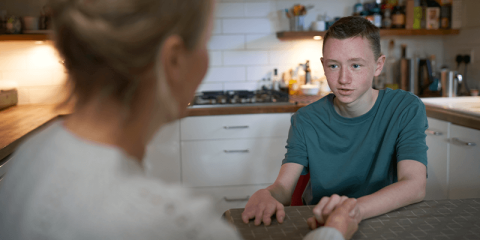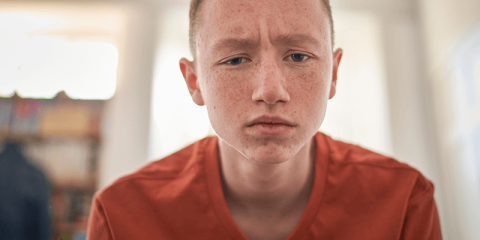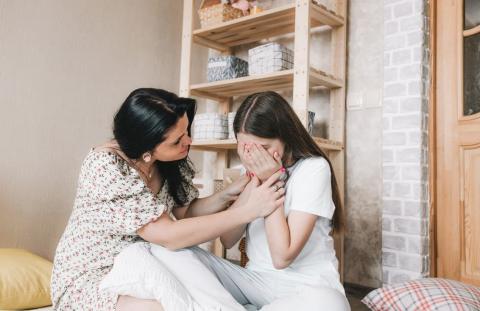Sadly, there’s a lot of stigma surrounding suicide. But being able to talk about it makes it easier for young people to confide in someone if they’re having suicidal thoughts, and to ask for help.
Lots of parents worry that talking to their child about suicide will make it more likely to happen – but this isn’t the case. In fact, research has shown that talking about it is more likely to save a life than make things worse.
Discovering your child is having suicidal thoughts is incredibly distressing for parents. But although it may feel hard to believe this when you’re going through it, it’s possible for your child to feel okay again.
What are suicidal thoughts?
Anyone can have suicidal thoughts at any time – thoughts that the only way to take control or escape an unbearable situation is to end their life.
Sometimes these thoughts can be triggered by a stressful or painful experience, like bereavement, bullying or abuse. Sometimes they are linked to other mental health conditions, like depression.
Suicidal thoughts don’t necessarily cause someone to attempt suicide, but they should always be taken seriously.
How can I tell if my child is feeling suicidal?
It can be hard to tell if your child is having suicidal thoughts, but there are some signs you can look out for. Bear in mind that these signs don’t necessarily mean your child is feeling suicidal, but it’s still important to talk to them if you spot any of them:
- changes in their behaviour – for example, if they stop doing things they used to enjoy or they start behaving in a way that’s out of character
- expressing feelings of hopelessness, worthlessness, sadness and/or guilt and shame
- becoming withdrawn – stopping seeing friends and family and spending lots of time alone
- losing interest in daily life over a period of time
- saying things like ‘I wish I wasn’t here’, ‘I can’t go on’, ‘I can’t take it anymore’, or ‘people would be better off without me’, or talking about death a lot
- giving away their belongings
- eating and/or sleeping more or less than usual
- losing interest in how they look
- using drugs or alcohol to help them cope when they’re struggling
- self-harming.
If you’re not sure how to approach the situation, you could talk to your GP, or contact an adviser at HOPELINE247 or another helpline (see ‘Getting help and support’ below).
However, the most important thing to do if you’re worried your child may be thinking about suicide is to ask them.
How do I talk to my child about suicidal thoughts and support them?
No parent wants to think that their child could be thinking about suicide. And many parents worry that talking to their child about suicide will put the idea into their head. But research has shown that this isn’t true, and that talking about suicide is more likely to save a life than make things worse.
Here are some tips for having that difficult conversation, and for helping your child get through this difficult time.
Tip #1: Get advice if you're unsure
Asking your child if they’re thinking about suicide is a scary thing to do, and you may want to chat to your GP or an adviser at HOPELINE247 or another helpline before you have the conversation (see ‘Getting help and support’ below). Talking to someone else will give you a chance to say the words out loud, and they can help you plan what to say.
Tip #2: Pick your moment
Find a time when you and your child are both calm and aren’t likely to be interrupted. You may need to make this time (for example, by taking an afternoon off work or asking someone else to look after any other children) rather than waiting for a good moment to arise.
Tip #3: Ask your child directly
You might want to begin with general questions, like ‘I’ve noticed you seem really down recently, is anything worrying you?’ But if you’re concerned your child may be having suicidal thoughts it’s best to ask them directly: ‘Have you been thinking about suicide?’ These conversation starters from Papyrus may help.
Asking directly gives them the opportunity to open up without having to be the one who raises the issue. This may come as a huge relief. It may also help them feel less alone.
And even if they say ‘no’ or don’t want to talk about it, you’ve broken the silence around suicide and they’ll know they can talk to you about it in the future if they want or need to.
Tip #4: Keep calm and listen
Finding out that your child is having suicidal thoughts is always going to be distressing. But try and keep calm and listen to what your child has to say. Concentrate on what they’re saying rather than worrying about what you’re going to say in response or how you can ‘fix’ this. When your child realises that you’re really listening to them and aren’t going to be angry or upset, this will make a big difference.
Tip #5: Tell them you’re glad they told you
Opening up about suicide is incredibly brave, so let them know you’re proud of them for talking to you.
Tip #6: Take them seriously
Remember that young people tend to feel emotions far more deeply than adults. What might seem like a fairly manageable problem to us may seem overwhelming and unbearable to them.
So don’t be tempted to downplay how they’re feeling, or tell them it’ll all blow over soon. Instead, be kind and compassionate and try to understand where they’re coming from.
Tip #7: Let them know you love them
It sounds obvious, but reassure them that you love them and are always there for them.
Tip #8: Make sure you have someone to talk to
After the conversation with your child, it may help to talk to a trusted friend or family member, or a helpline adviser. This will give you a chance to process what they’ve said and let out your feelings in a safe space.
Tip #9: Work together
Your first instinct as a parent will probably be to try to sort the situation. But swooping in with solutions (like changing schools if they’re being bullied) won’t help if it’s not what your child wants. Likewise, asking ‘What can I do to make things better?’ may not help either – they probably don’t know.
Instead, try to work together to understand why they feel the way they do and what you could do together to make things better.
Tip #10: Help them make a safety plan
Helping them create a safety plan is a really practical way you can help – and doing something practical could make you both feel a bit better. A safety plan involves things like:
- helping them work out what triggers suicidal thoughts
- finding ways to help them distract themselves, like going for a walk, playing an online game or watching a favourite film – Childline has lots of suggestions they could think about
- making a list of people they could talk to
- removing anything they could use to hurt themselves.
You can find out more about making a safety plan on the SAMH website.
Tip #11: Talk to your GP
This is a difficult situation, and you certainly don’t need to deal with it on your own. There are lots of services offering support and help for you and your child, starting with your GP. They can refer your child for counselling or therapy, or to Child and Adolescent Mental Health Services (CAMHS). Even if your child won’t go to see their GP, you can go on your own for advice.
This page on YoungMinds explains more about how your GP can help.
Our section on ‘Getting help and support’ below lists other organisations that can help.
Getting help and support
Support for young people
- Childline offers free confidential advice and support for children and young people.
- YoungMinds provides free, 24/7 text support for young people across the UK experiencing a mental health crisis.
- If your child needs someone to talk to, Samaritans is available any time of day or night.
- HOPELINE247, run by suicide prevention charity Papyrus, offers confidential support and practical advice via phone, text or email.
- Young people can find more resources to support them on the Suicide Prevention Scotland website.
Support for parents
- Anyone who’s concerned that a young person could be thinking about suicide can contact HOPELINE247, which offers confidential support and practical advice via phone, text or email.
- Parentline Scotland provides free advice and support on all aspects of parenting.
- YoungMinds have a friendly, confidential parents' helpline and webchat service offering information, advice and signposting.
What to do in an emergency
If your child has already taken steps to end their life, you should get emergency help straightaway, either by taking them to A&E or calling an ambulance on 999.
If they go missing, you should call the police on 999. This won’t get them in trouble – the police have the resources to find people who are vulnerable to suicide and get them help.
You can find more advice on the YoungMinds and Papyrus websites.
Suicide Prevention Scotland’s toolkit
Suicide Prevention Scotland have produced a toolkit to support young people to keep themselves safe and reach out to a safe person (sometimes called a trusted adult). If they reach out to you using the toolkit it's very possible that they're looking for some support and they consider you their 'safe person'. This may be upsetting but it’s a big, brave step forward for the young person. You can find helpful advice for processing this and supporting the young person on the Suicide Prevention Scotland website.
 Activities & Play
Activities & Play Behaviour
Behaviour Childcare
Childcare Development & Growing Up
Development & Growing Up Family, Friends & Relationships
Family, Friends & Relationships Feeding Your Baby
Feeding Your Baby Food & Eating
Food & Eating Health & Safety
Health & Safety Mental Health & Wellbeing
Mental Health & Wellbeing Money & Work
Money & Work Online Behaviour & Safety
Online Behaviour & Safety Pregnancy & First Days
Pregnancy & First Days School & Education
School & Education Sleep
Sleep












 Behaviour
Behaviour
 Sleep
Sleep